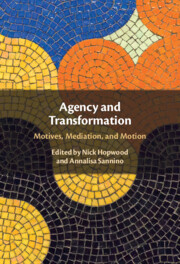Book contents
- Agency and Transformation
- Agency and Transformation
- Copyright page
- Dedication
- Contents
- Figures
- Tables
- Contributors
- Preface
- Acknowledgments
- Chapter 1 Motives, Mediation and Motion
- Chapter 2 Toward a Power-Sensitive Conceptualization of Transformative Agency
- Chapter 3 The Tasks of Reality and Reality As the Task
- Chapter 4 A Relational View of a Future-Orientated Pedagogy
- Chapter 5 From Future Orientation to Future-Making
- Chapter 6 Excluded Lives
- Chapter 7 Children’s and Youth’s Civic Projects and Responsible Agency
- Chapter 8 Decolonizing Agency
- Chapter 9 Unpacking Social Articulation of Agency
- Chapter 10 The Emancipatory Nature of Transformative Agency
- Chapter 11 Choice in Childbirth, Agency and Collective Action
- Chapter 12 Transformative Agency by Double Stimulation in an Ecological Agroforestry Association from Brazil
- Chapter 13 Transformative Agency and the Cultivation of Innovations in Frontline Homelessness Work
- Chapter 14 Children’s Agency during the COVID-19 Pandemic in China
- Chapter 15 Agency As the Direction and Reach of Actions
- Index
- References
Chapter 15 - Agency As the Direction and Reach of Actions
A Theoretical Outline
Published online by Cambridge University Press: 23 November 2023
- Agency and Transformation
- Agency and Transformation
- Copyright page
- Dedication
- Contents
- Figures
- Tables
- Contributors
- Preface
- Acknowledgments
- Chapter 1 Motives, Mediation and Motion
- Chapter 2 Toward a Power-Sensitive Conceptualization of Transformative Agency
- Chapter 3 The Tasks of Reality and Reality As the Task
- Chapter 4 A Relational View of a Future-Orientated Pedagogy
- Chapter 5 From Future Orientation to Future-Making
- Chapter 6 Excluded Lives
- Chapter 7 Children’s and Youth’s Civic Projects and Responsible Agency
- Chapter 8 Decolonizing Agency
- Chapter 9 Unpacking Social Articulation of Agency
- Chapter 10 The Emancipatory Nature of Transformative Agency
- Chapter 11 Choice in Childbirth, Agency and Collective Action
- Chapter 12 Transformative Agency by Double Stimulation in an Ecological Agroforestry Association from Brazil
- Chapter 13 Transformative Agency and the Cultivation of Innovations in Frontline Homelessness Work
- Chapter 14 Children’s Agency during the COVID-19 Pandemic in China
- Chapter 15 Agency As the Direction and Reach of Actions
- Index
- References
Summary
We need theories that help us join the struggle for alternative futures. Cultural-historical approaches frame agency as something people do rather than something they have or sense. Building on this, I conceptualise agency in terms of the direction and reach of actions. Direction concerns movement from distinctive subject positionings towards desired endpoints. Reach concerns the extent of this movement. Direction and reach can be both outward (transforming the world) and inward (transforming the self). This acknowledges individuals’ contributions to changing their own lives and those of others without evacuating actions from the activities in which they are embedded. Motive, mediation, and motion are key to this. I illustrate these ideas in relation to existing research on young people’s environmental activism, a Latino boy in foster care, and a mother struggling to care for her infant child, as well as examples from prior research and other chapters in this volume.
Keywords
- Type
- Chapter
- Information
- Agency and TransformationMotives, Mediation, and Motion, pp. 355 - 382Publisher: Cambridge University PressPrint publication year: 2023



